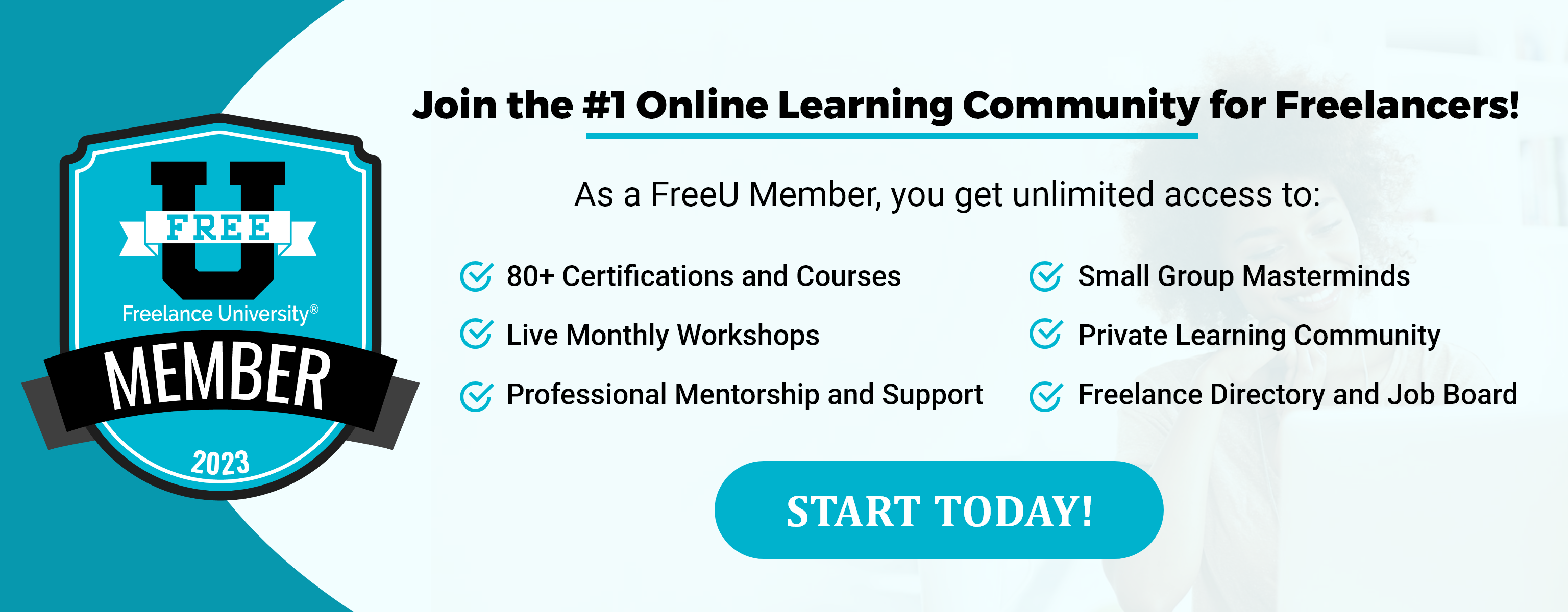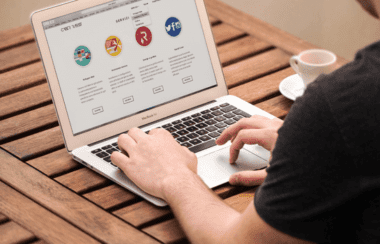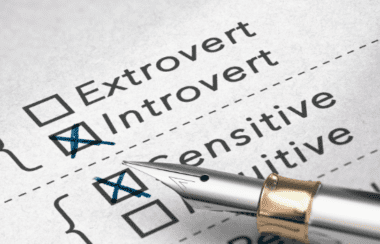How to Avoid Burnout in Your Freelance Business
By Jena Kroeker

Have you ever sat down at your computer completely exhausted … and you haven’t even turned it on yet? When you reach this point, you’re facing an important challenge — to avoid burnout in your freelance business. In this post, we’ll share strategies to help you conquer burnout now and prevent it in the future.
What Is Burnout?
In a recent article, Juli Fraga explains how the World Health Organization (WHO) defines burnout as a “syndrome conceptualized as resulting from chronic workplace stress that has not been successfully managed.” She summarizes the three symptoms: “feelings of energy depletion or exhaustion,” “increased mental distance from one’s job or feelings negative towards one’s career,” and “reduced professional productivity.”
Have you ever felt like that? Many of us have. The Merriam-Webster Dictionary also provides a good description, calling it “exhaustion of physical or emotional strength or motivation usually as a result of prolonged stress or frustration.”
A couple takeaways from these definitions:
• Both refer to “prolonged” or “chronic” stress or frustration that has not been managed.
• Both talk about a loss of “productivity” or “motivation.”
These factors suggest that we must learn to manage work stress before it continues too long. If we don’t, we run the risk of losing passion for work we previously loved.
My Experience with Burnout
Before I entered the world of freelancing, I had a job where I worked with people all day. I loved the people I worked with. But back then, the words “introvert” and “extrovert” were rarely used or understood. So when I began to feel like a car that had run out of gas, I didn’t know why I felt that way, and I didn’t know how to remedy it. I became so run-down, I caught the flu and took a month and a half to recover.
Turns out I’m an introvert who needs solitude in order to recharge. We discuss the difference between introverts and extroverts in a previous blog post, “An Introvert’s Guide to Networking like a Rock Star.” If you’re an introvert, you may also find solitude and downtime essential to preventing burnout.
Fast-forward to my freelance career, and I now know how to recognize the symptoms of burnout and stop them in their tracks. During the COVID-19 pandemic, as vacations were cancelled, and every day became a possible workday, I started to experience that familiar “car out of gas” feeling. Below are some strategies that helped me avoid burnout and can help you too.
How to Avoid Burnout in Your Freelance Business
1. Practice Good Self-Care.
The first thing to remember is that self-care doesn’t equal selfishness. You may have heard the example of putting your own oxygen mask on before helping others put theirs on. You need to be healthy and well-equipped so you can serve your clients well.
In an article titled “How to Avoid Freelancer Burnout: 6 Tips,” Robin Madell says, “Freelancers in the zone can become almost machine-like in their commitment and willingness to crank out deliverable after deliverable for their clients. If this sounds familiar, you might start feeling more like a worker than a person.” In this case, the article recommends maintaining balance by exercising, eating properly, and pursuing other interests outside of work.
You can also practice good self-care by taking short breaks throughout the day, getting enough sleep at night, and spending quality time with friends and loved ones. If you find yourself at home more often during the COVID-19 pandemic, think of enjoyable activities you can plan and look forward to, even if it’s a simple movie night or games night with your household.
2. Manage Your Productivity and Time.
One of the benefits of freelancing is that you are your own boss in charge of your own schedule. But sometimes we make things harder for ourselves by creating a relentless work routine. The article above points out that “another big red flag for freelancer burnout is a willingness to work around the clock.”
Instead, it’s important to have some sort of regular work schedule that avoids long hours if possible. As the article says, “While occasional short-term crunch periods are expected when you need to make a deadline, you should avoid falling into a regular habit of overwork if you want to be able to be a long-term freelancer.”
Here are some ways you can manage your productivity and time:
• Use time blocking methods, where you plan to work on specific tasks for a specific length of time during the day.
• Use time tracking tools like Toggl or FreshBooks to manage breaks and keep a record of how long you’re working.
• Be careful about responding to urgent tasks from clients. If it becomes habitual, you’ll start to feel like you’re on call and may risk exhaustion. Communicate with the client to determine what is defined as truly urgent.
• Manage your phone and app notifications. Silence notifications when you’re not working or are deeply involved in a task. As an example, I used to become distracted by my project management app. It got to the point where I would look at my phone whenever I heard a similar sound on TV. I once heard a bird chirp outside and mistook it for an app notification. That’s when I realized it’s better to check notifications at certain times rather than reacting to them instantly.
Above all, remember “we control how we use our time, not the other way around” — wise advice shared in Kelsey Yarnell’s article, “To Avoid Burnout, I Shifted My Workday 4 Hours Backwards. Here’s What Happened.”
3. Find Ways to Stay Passionate about Your Work.
As we mentioned above, one of the symptoms of burnout is a loss of motivation or negative feeling about your career. When you avoid burnout, you have a greater chance of maintaining the passion that drew you to your freelance niche in the first place. But let’s face it — you won’t enjoy everything about your work. There will always be some tasks that are less enjoyable than others. The aim is to enjoy most of it and keep it from exhausting you.
Here are some strategies you can use:
• Inject your own creativity into client work. For example, if you’re a writer, suggest ways to spice up a topic and make it more engaging for readers. Feeling free to make creative suggestions will both help your client and invigorate your work.
• Review your current tasks to ensure that they’re still within your scope of interest, especially if you’re amplifying your niche. Is it amplifying so much that it’s stretching you thin, or is it still in an area that’s rewarding for you?
• Watch out for scope creep, where you find yourself doing extra tasks not listed in your contract. These tasks can take extra time and may exhaust you if they’re too far outside your niche.
• Don’t work all the time, especially if you’re at home all day. Step away from your desk to pursue other activities, both related and unrelated to your work.
• Take courses, read blog posts, listen to podcasts, and seek other resources that will help you hone your skills and give you greater mastery of your work.
4. Define Healthy Boundaries with Clients.
This strategy circles back to our first strategy about self-care. One way to serve our clients well and avoid burnout is to look after ourselves and put boundaries in place. The best and kindest way to do this is by establishing healthy communication and expectations at the beginning of a client relationship.
When I onboard new clients, I send them a “welcome kit” that includes my contract and an explanation of what they can expect when working with me:
• When to expect a response to their emails (within a certain number of hours during business days)
• Our primary mode of communication for regular work and secondary mode of communication for emergencies
• My business hours
• Days when my office is closed
• Public national holidays and religious holidays observed by my business
• Policy for notifying clients of vacation time and arranging how I can be contacted for any urgent matters while I’m away
• Extra charges for rush jobs with less than 24 hours’ notice or occurring on evenings, weekends, or holidays.
You may have other expectations you’d like to add to this list. The key is to communicate clearly and be consistent about your boundaries. For instance, if you say that you don’t work weekends, but sometimes need to finish tasks on a Saturday or Sunday, let your client know this is the exception, not the rule.
It’s also important to be honest throughout your relationship with your client, especially during extraordinary times. If you find yourself thinking, “Oh no, not another Zoom call,” when your client suggests a meeting, think of other options. In her article, “How To Avoid Burnout In The Age Of Remote Work,” Shelcy V. Joseph agrees that “connection is key” but offers the following suggestion:
“For most people, video conferencing is providing a necessary connection to your co-workers, and having some face time reminds them of their support network.
“That said, not every meeting needs to be on video as constant virtual appointments can become burdensome and a stressor. Take some calls walking or sitting outside for some necessary balance.”
And determine a schedule for meetings with your clients so you can plan ahead. This will help you make the most of your time instead of receiving unexpected calls.
Final Thoughts and Encouragement
The business and lifestyle you’ve built is too valuable to lose because of burnout. If you’re feeling a loss of motivation or productivity, try the above strategies. And if your exhaustion persists, seek the help of a medical professional or counsellor.
Now we’d love to hear from you! What strategies have helped you avoid burnout in your freelance or virtual assistant business? Are there any additional ones you’d add to the list? Please share your thoughts in the comments below.









































































































